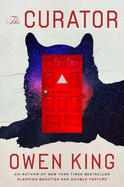
Owen King takes readers into an impeccably crafted, wildly imaginative world in The Curator, as a young woman tries to find out what happened to her long-dead brother while the city in which she lives crumbles around her.
The unnamed city is known for its "essential unmappability," nicknamed the Fairest and ruled for centuries by "handsome, heavy-browed monarchs." It is dotted with luxury hotels, traces of pagan rites, secret societies and pickpockets, and split down the middle by a dank, gray-water river known as the Fair. King (Double Feature) succeeds in making this setting feel entirely strange and also eminently knowable--a hallmark that carries throughout nearly every aspect of The Curator, at once fantastical and yet grounded in a too-familiar reality of corrosive greed and power grabs. These things come to a head in the opening pages of King's novel, as the Fairest has just staged a revolution and is working to create a Provisional Government, to be led by an unlikely trio: a playwright, a once-wealthy student and a dockman. "They had done it, the whole bunch of them, literate and illiterate alike: thrown the brakes on the machine and brought it to a halt before it could swallow up any more lives. They'd taken back the nation's wealth for the people who made it."
Amidst the settling dust of the rebellion, Dora ("D") yearns to finally discover what happened to her long-dead brother, who once worked for the Society of Psykical Research. Before his untimely death, D asked her brother where he went during the daytime, only to be told, "I made friends with one interesting person, one thing led to another, and now I'm part of a whole set of interesting people, and we're going to save the world. I hope you'll want to join us eventually." Somewhat unwittingly, that's exactly what D does in her search for answers. Finding the Society's building reduced to rubble, she contrives to become curator of the National Museum of the Worker in the building next door, spending weeks carefully reconstructing the wax figurines in their employment habitats and picturing in her mind the rooms in which each figure lives, just as she does for each new person she meets. When a new neighbor moves in on the other side and her nights become punctuated by the screams of torture victims, the vision of the rebellious city and its new government begins to crack as D is brought further and further into schemes for power, money and everlasting life.
Because, despite the apparent success of the revolution, something in the city is off: "[T]here was a sense of something furtive and sly and marginal pervading everything, both inside and outside the walls of the museum." That sense leaks out across every page of The Curator, as what D--and the reader--believes to be true is slowly revealed to be a lie. Or, at the very least, an incomplete representation of the truth. Rumors abound: a Morgue Ship sailing across solid land, collecting the souls of murdered folk across the city; holy cats scheming; pickpockets and cutpurses leaping into the mayhem to make a penny or two; a stalled army front far away on the road into the city. As the cast of characters with whom D interacts becomes an increasingly complex web of interconnected people (it turns out six degrees of separation applies even in King's fantastical setting), the slow untangling of each rumor and how each person is connected to it is as compelling as D's own story.
That's the true magic of The Curator: watching King weave a story that is at once epic in scope--so many characters! Side plots galore! Romance and intrigue! Magic and gore and torture and lore!--and entirely focused on one woman: a daughter turned orphan turned maid turned accidental revolutionary turned curator of a national museum turned city's saving grace. The Curator is ultimately as difficult to categorize as D is, weaving together the real and the fantastical, full of curiosities and wonders, violence and beauty, and incredibly nuanced and layered characters that feel real. It's an absolute riot of a read, requiring a bit of patience as readers learn alongside D what to believe and whom to trust, what is real and what is fabricated--and whether that even matters in the end. With dark humor and a keen eye for detail, King invites readers into a genre-defying narrative that asks readers to imagine what might be and what could be, as a woman stands between two worlds of her own, asking the same. --Kerry McHugh

